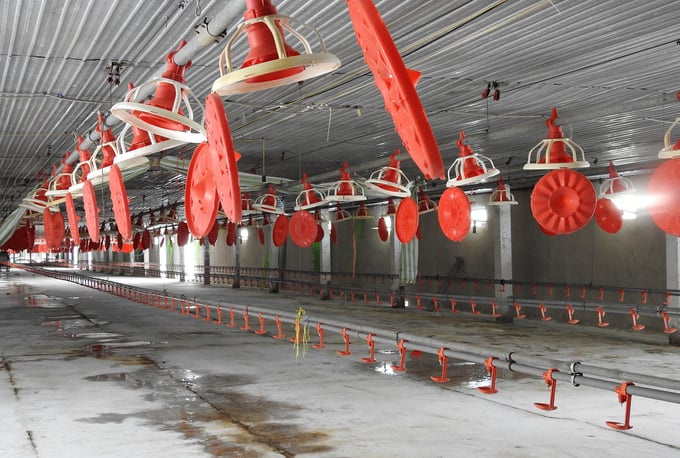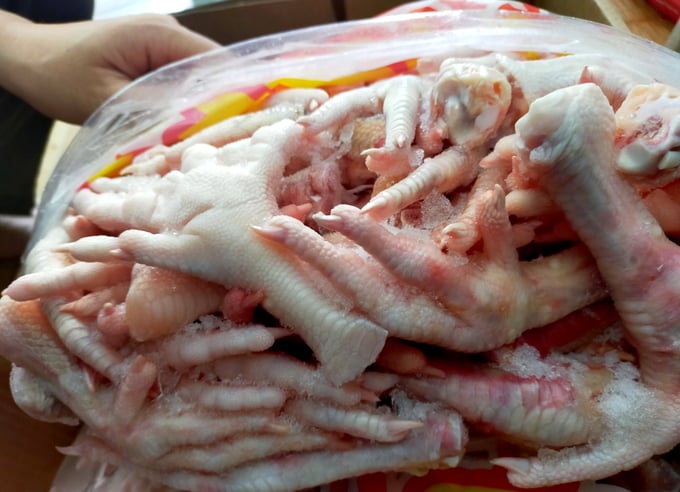November 27, 2025 | 22:23 GMT +7
November 27, 2025 | 22:23 GMT +7
Hotline: 0913.378.918
November 27, 2025 | 22:23 GMT +7
Hotline: 0913.378.918

Due to low chicken prices, a large chicken farm in Dong Nai had to be closed earlier this year. Photo: Son Trang.
The Vietnam Poultry Association (VIPA) has just sent an official dispatch to the Prime Minister, the National Assembly Standing Committee, and relevant ministries and agencies, proposing some solutions to remove difficulties for the poultry industry.
According to Mr. Nguyen Thanh Son, President of VIPA, over the past time, illegal transportation and trade of poultry and poultry products across the border into Vietnam have continued to be complicated in localities sharing the same border with countries, especially in the central and southern provinces.
Incomplete statistics of VIPA show that tens of thousands of tons of discarded live chickens are smuggled across the border into our country every month.
This is not only one of the reasons for the increased risk of infection with highly pathogenic avian influenza viruses and other dangerous infectious diseases in Vietnam, but also seriously affects the domestic livestock industry.
Faced with the increasing situation of smuggled poultry and poultry products, on May 4, 2023, the Ministry of Agriculture and Rural Development sent a document to the Ministry of Public Security, the Ministry of National Defense, and localities, proposing to strengthen measures to prevent, detect and strictly handle cases of illegal transportation of poultry, poultry products across the border and livestock products temporarily imported for re-export into Vietnam.
However, so that the above situation does not happen again after each end of the campaign of ministries, branches, and localities, VIPA proposed that the Ministry of Agriculture and Rural Development coordinate with the Ministry of Public Security, the Ministry of National Defense, and localities to regularly Regularly and continuously organize inspection, control, prevent and strictly handle organizations and individuals that illegally transport and trade in poultry and poultry products across the border.
In addition to smuggling, also in the past time, there were many poultry by-products with meager prices, such as legs, heads, necks, wings, skin, and gizzards, especially laying hens that have been frozen with their heads removed, removing legs and offal (this type of chicken is mostly not used in developed countries as food for humans) is still imported in vast quantities to the Vietnamese market for food for people.

Cheap imported chicken feet sold in Ho Chi Minh City HCM. Photo: Son Trang.
On the other hand, there is a paradox that while Vietnam banned the use of Ractopamine, Cysteamine as growth stimulants and lean animals (160 countries around the world also had similar bans), annually, large amounts of pork, beef, and chicken from some countries are allowed to use the above two substances for livestock and poultry are still imported into Vietnam.
Meanwhile, Vietnamese enterprises have to face many strict technical barriers from importing countries to export livestock products, making our country's livestock products weak and disadvantaged in the domestic market.
According to data from the General Department of Customs, in the last 5 years, the annual volume of imported chicken meat has increased continuously, accounting for 20-25% of our country's total chicken meat consumed.
VIPA said that if the above conditions are not controlled, domestic poultry production will become more and more complex, and it may also have consequences for the health of Vietnamese consumers.
Therefore, to create a healthy and fair competitive environment for domestic businesses and breeders, especially without creating a risk of adversely affecting consumers' health, VIPA proposes that the Government promulgate a document banning the import of meat products from countries that use growth stimulants Ractopamine and Cysteamine.
Also, VIPA proposed the Ministry of Agriculture and Rural Development and relevant ministries and branches immediately implement non-tariff measures to protect poultry production and consumer health.
Accordingly, soon build technical barriers reasonably and in line with international practices (can refer to the experience of Thailand and some countries in the region) to limit the trade deficit of poultry and poultry products like last time.
According to the Ministry of Agriculture and Rural Development, through reflections from media agencies and people, the situation of illegal transportation and trade of poultry and poultry products across the border into Vietnam continues to take place common and complicated in localities sharing borders with other countries, especially in the central and southern provinces.
This may be one of the reasons for the increased risk of highly pathogenic avian influenza viruses and other dangerous infectious diseases entering Vietnam from abroad and spreading to other localities, seriously affecting the domestic poultry industry and people's health.
Translated by Ha Phuc

(VAN) On November 27, in the meeting with Minister Tran Duc Thang, Mayor Yin Yong shared Beijing’s experience to improve environment and air quality.

(VAN) After 30 years, both sides identified strategic areas of cooperation: sustainable production, increasing coffee value and training for farmers.
/2025/11/27/4910-4-164708_294.jpg)
(VAN) On the afternoon of November 27 in Beijing, Minister of Agriculture and Environment Tran Duc Thang held a working session with several major Chinese enterprises operating in the agriculture and environment sector.

(VAN) The Department of Animal Health issued a provisional guideline requesting local authorities to increase surveillance, collect samples for testing, and conduct epidemiological investigations according to the established procedure.

(VAN) The United Nations recommends that Vietnam utilize data and artificial intelligence to enhance early disaster warnings and reduce GDP losses by 3.2% in the context of climate change.

(VAN) On the morning of November 27 in Beijing, Minister Tran Duc Thang and the Deputy Commissioner General of the General Administration of Customs of China signed a protocol on fresh jackfruit exports.

(VAN) As floodwaters recede, a vast network of irrigation works across eastern Gia Lai is emerging in a state of severe disrepair, with extensive damage demanding urgent restoration ahead of the 2025-2026 winter-spring cropping season.